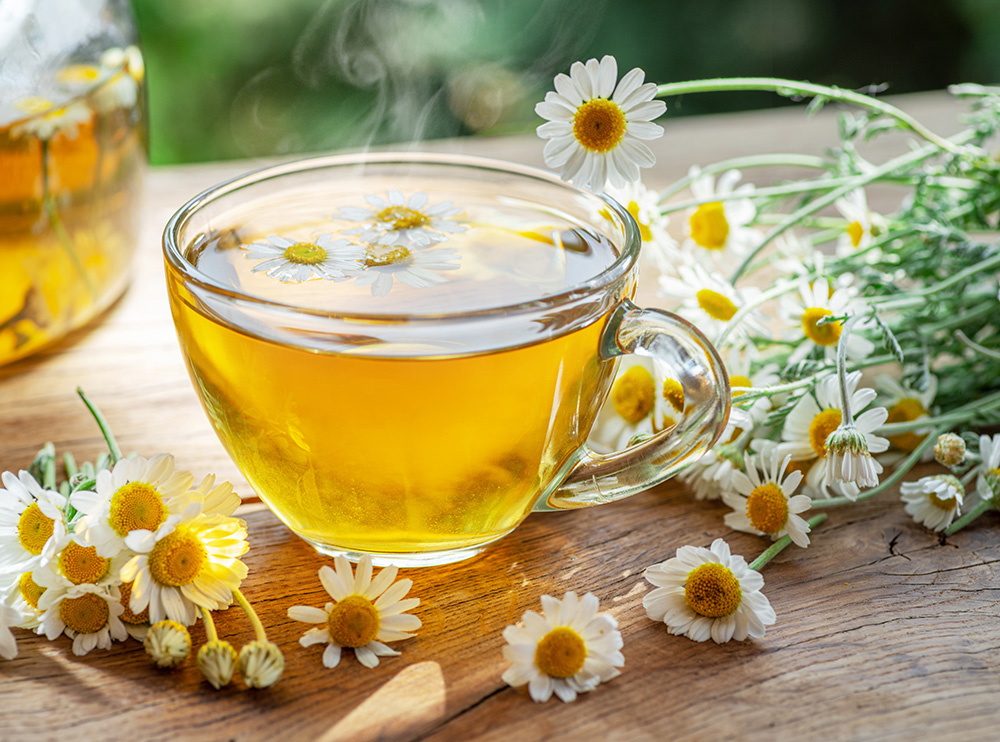Chamomile stands as one of humanity’s oldest medicinal plants, with documented usage dating back to 1550 B.C.E. Known for its gentle and natural properties, chamomile has been incorporated into teas, skincare routines, haircare regimens, and overall health practices across civilizations. Belonging to the Asteraceae (daisy or sunflower) family, chamomile boasts a daisy-like appearance with small white petals, a yellow center, and a slender stem, reaching heights of nearly 3 feet. Ancient societies such as those of Rome, Greece, and Egypt utilized dried chamomile flowers and their essential oils for medicinal purposes. Today, German chamomile (Matricaria chamomilla) and Roman or English chamomile (Chamaemelum nobile) remain prevalent in herbal medicine, with German chamomile being the preferred species for medicinal use. Various chamomile preparations have been developed over time, with herbal tea being the most popular, consumed in excess of one million cups per day.

What are the benefits of Chamomile tea?
Promotes better sleep:
Certainly, chamomile tea serves as a wonderful beverage post-dinner or before bedtime. Historically, chamomile in various forms like tea and essential oil therapy has been employed to address insomnia and promote relaxation. This herbal remedy contains apigenin, an antioxidant that interacts with specific receptors in the brain, potentially fostering drowsiness and alleviating insomnia, characterized by persistent difficulty falling or staying asleep.

Promote Digestive Health:
While chamomile tea may possess a delicate taste, its digestive benefits are substantial. Whether addressing stomach cramps or acid reflux, chamomile offers relief with just a single cup. Traditionally, chamomile has been employed to alleviate various gastrointestinal issues, such as digestive disorders, colic or spasms, upset stomach, gas, ulcers, and gastrointestinal irritation. Especially adept at alleviating gas, soothing the stomach, and easing intestinal muscle tension to facilitate food digestion.
Promotes healthy heart:
Chamomile tea contains specific antioxidants, such as flavonoids, which play a crucial role in promoting heart health by reducing the risk of cardiovascular disease. Extensive research conducted over the years has examined the efficacy of flavonoids in regulating blood pressure and cholesterol levels, including triglycerides and low-density lipoprotein (LDL) cholesterol, commonly referred to as “bad” cholesterol. These studies provide compelling evidence for the beneficial impact of chamomile tea consumption on cardiovascular well-being, underscoring its potential as a natural means of safeguarding heart health.
Reduces anxiety:
Enjoying a cup of chamomile tea can effectively diminish stress and ease anxiety. Renowned for its calming effects, chamomile offers a fragrant and soothing beverage suitable for any time of day. Its gentle sedative properties enable both physical and mental relaxation, aiding in alleviating tension and promoting tranquility.
Good for your immune system:
Drinking chamomile tea has the potential to offer advantages to your immune system. While ongoing scientific investigations delve into the extensive array of benefits associated with chamomile, emerging research indicates the presence of antibacterial properties within chamomile. These properties have the capacity to enhance your body’s ability to fend off illnesses, thus playing a role in supporting the maintenance of a resilient immune system.




1 Comment
I do not even know how I ended up here but I thought this post was great I dont know who you are but definitely youre going to a famous blogger if you arent already Cheers.